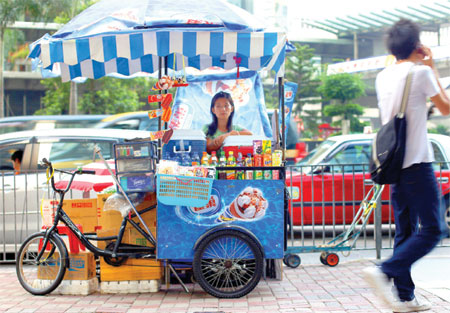None for the road
Updated: 2010-10-29 08:31
By Michelle Fei(HK Edition)
|
|||||||
|
A street hawker in Central. The industry is a vanishing tribe in Hong Kong. Photos by Edmond Tang / China Daily |
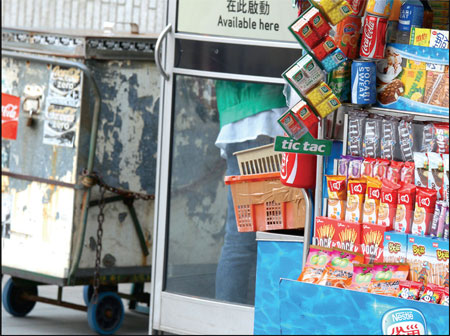
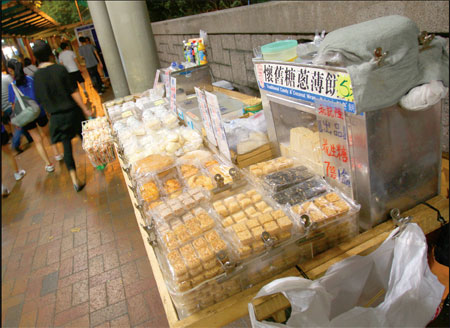
Street hawkers, who represent the city's way of life, are fast becoming 'outcast'in the government's scheme of things that favor giant chains and super malls. Michelle Fei reports.
With the summer slowly melting away the city's ice cream vendors' business is freezing.
A tiny ice cream stall, which was set up on a tricycle, stands cheerlessly amid scores of people walking past the World-wide House in Central district.
Hard times are upon Panda Stuart, a 23-year-old man, who started this business in November last year. Business is not quite rollicking for this ice-cream fan. The shadow between his idea and the reality is lengthening.
"We barely make a living out of the ice-cream selling," said his girlfriend, Polly Ho, who is also a partner in the business. While the young hawker curls up in a little space for an afternoon nap, Ho does the talking on the hard times facing them both. "We don't even know how we can compete with those giant chain stores like Seven-Eleven and Wellcome. Some of their ice creams are cheaper than ours," Ho explains why goings have got tougher. The frustration and depression in her voice are unmistakable.
The young couple works nine hours a day, from morning to evening, yet can make about HK$8,000 a month. One HK$10 Nestle cone earns them HK$2. So, to ensure that HK$8,000 a month, they've got to sell at least 135 cones every day.
However, they don't quite regret having chosen this business.
"We felt very lucky when we got the hawking license last year. We told each other that we must give it a try no matter how hard things might get. For us the license is so precious," says Ho.
The Itinerant Hawking License (IHL) that Stuart got in November 2009 was quite a thing for the tightly-controlled hawking industry.
The SAR government had stopped issuing new hawking licenses since 1970 with a view to phasing out hawkers.
But in the face of voices advocating revitalizing hawking activities, an inalienable feature of Hong Kong for more than 100 years, the government was somewhat forced to renew its policy in 2008 and issued a small batch of hawking licenses to Central hawkers who bear a distinctive local character.
"The (hawking) business is about to disappear sooner or later, maybe in 30 or 40 years, when all old hacks like me are gone," said Siu Chi-shing, 71, who has been into ice-cream vending for about half a century.
Siu told China Daily that most of the vendors are old, yet the current government policy prohibits one from transferring his license to his descendant. That makes the industry a vanishing tribe.
Besides natural attrition, the hawker has also been shrunk by a voluntary surrender of license scheme. Introduced in 2003, the scheme has given the government the power to buy back an IHL at HK$30,000 or exchange for vacant fixed pitches. Till 2010, more than 460 licenses were surrendered.
The situation for fixed pitch hawkers is more or less similar: street vendors were moved into "Kai Shi" (markets); only one license could be given to each family under a tight hawker-control policy regime.
"Being moved into the market has hardly been rewarding for me," said Wong, an unlicensed hawker. He earns about HK$6,000 a month by selling Dragon's Beard Candy on the street. A fixed pitch license in the market is not appealing to him as it would cost more than HK$1,000 a month.
"It is a pity that we don't get those lovely food," said Cher Wong, a 49-year-old Sha Tin resident who just bought a box of Dragon's Bread Candy for HK$10 from Wong. She told China Daily that she would grab every chance to buy those "nostalgic food".
Food and Environmental Hygiene Department data show that the number of licensed hawkers, including both itinerant and fixed pitch vendors, has dropped from 7,484 (2006) to 7,215 (September 2010).The department cites public space obstruction and nuisances as the reason.
But that sounds illogical for a 50-year veteran. "Do they consider us a shame in the giant financial hub?" asks 75-year-old surnamed Leung who started his business in 1960. "I fail to figure out why we cannot fit into the place," he says. Leung has raised two basic questions: Why should small traders get the boot and have to be wiped out to pave the way for development; Why are they always seen as nuisance or impediment to growth? The old man tells China Daily that one of his relatives, who shifted to the US in the 1970s, is enjoying his life as an unlicensed hawker here. "He sells souvenirs like t-shirts on Wall Street," Leung says.
"If such a behemoth financial hub like Wall Street can have space for vendors, why can't Hong Kong, the so-called Asian financial center?" Leung asks.
For Doris Chan, a Tai Po resident, it's "quality" and "taste" that matter most.
"Forget obstruction, forget hygiene, the fact is the quality of food significantly has dropped since they moved into the market," Chan says. "Shopowners have to sell long-stored stuff," she adds. According to Chan, such foods have lost their character and appeal. "In an intensely competitive market, they are just copying others' best-selling dishes. The variety is missing. We want something different, but you get the same stuff everywhere. It's only the color of chairs that distinguishes one shop from another. It's so pathetic," says Chan.
However, Hongkongers still love street food. According to estimates by the local media, some 3.75 million pieces (roughly 55 tons) of Fish Balls are consumed by Hongkongers every day. Food stalls in the city's bustling night bazaars are choc a block with locals and visitors.
"The (street) markets are an exciting and vibrant reminder of Hong Kong's origins as a trading city," says Bill Stacey, chairman of Lion Rock Institute. A local free-market thinktank and a strong supporter of the hawking business, Stacey urges the government to take steps to revive it.
Aside from cultural benefits, he stresses, a thriving hawking business will create more job opportunities and dignified alternatives for those who lose their low-paid jobs once minimum wage is enforced.
Stacey also suggests that the government start with some itinerant hawkers on the newly constructed waterfront. This, he said, will not upset local residents or shopowners, and can even be expanded to the estates in New Territories and revive small-scale business in villages.
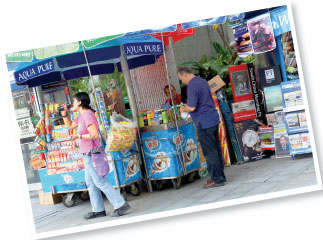
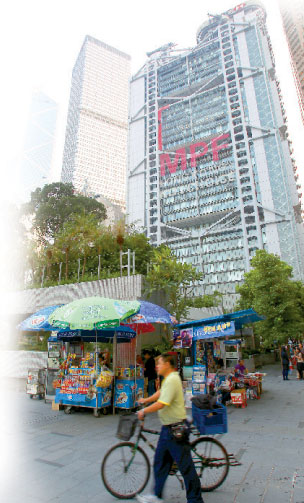
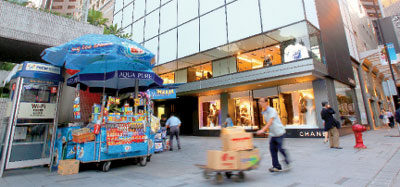
(HK Edition 10/29/2010 page8)
